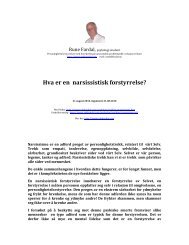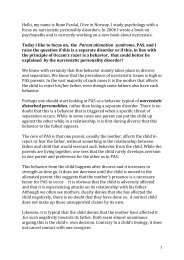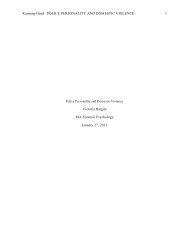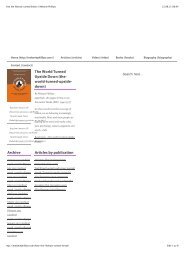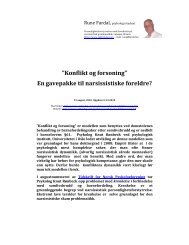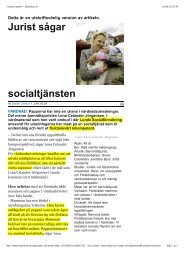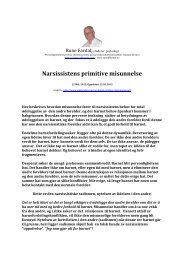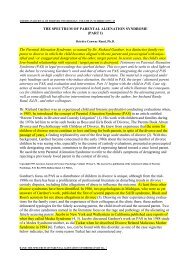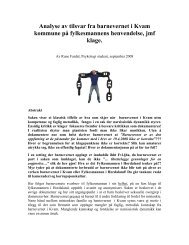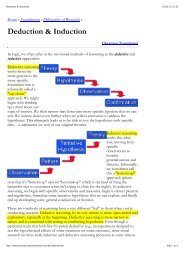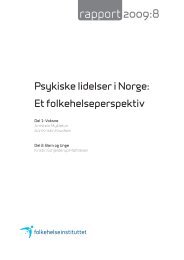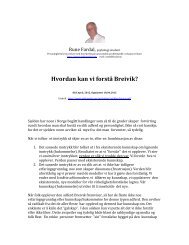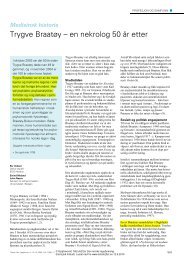The origins of narcissism and narcissistic personality disorder a
The origins of narcissism and narcissistic personality disorder a
The origins of narcissism and narcissistic personality disorder a
Create successful ePaper yourself
Turn your PDF publications into a flip-book with our unique Google optimized e-Paper software.
THE ORIGINS OF NARCISSISM 89<br />
world <strong>of</strong> separateness <strong>and</strong> division, <strong>of</strong> ambiguity <strong>and</strong> uncertainty, <strong>and</strong><br />
<strong>of</strong> conflict, loss, <strong>and</strong> death. Narcissistic illusions exist because life would<br />
be intolerable without them. Thus, the Greek word narke, meaning<br />
stupor or numbness, is the root <strong>of</strong> both narcotic <strong>and</strong> Narcissus (Spotnitz<br />
& Resnik<strong>of</strong>f, 1954). On the other h<strong>and</strong>, as this etymological relationship<br />
suggests, the <strong>narcissistic</strong> resolution to the problem <strong>of</strong> separateness,<br />
even if endemic in human affairs, remains problematic. <strong>The</strong> myth <strong>of</strong><br />
Narcissus is a cautionary tale; it tells us that the price <strong>of</strong> self-absorption<br />
<strong>and</strong> self-inflation-in essence, <strong>of</strong> vanity-is death. More immediately,<br />
clinical considerations tell us that <strong>narcissistic</strong> <strong>personality</strong> <strong>disorder</strong> is<br />
still pathological <strong>and</strong> that even normal <strong>narcissism</strong> still involves an<br />
overvaluation <strong>of</strong> the self at the expense <strong>of</strong> others (or, in Asian cultures,<br />
the reverse).<br />
Naturally, therefore, one wonders whether a non<strong>narcissistic</strong> resolution<br />
to the dilemmas <strong>of</strong> separateness is possible. If, by non<strong>narcissistic</strong><br />
resolution, one means a state in which <strong>narcissism</strong> no longer exists, then<br />
such a condition is highly improbable. Narcissism is an attempt to<br />
eliminate the tension <strong>of</strong> division within the self <strong>and</strong> from others<br />
through the pursuit either <strong>of</strong> an illusory merger with the totality or <strong>of</strong><br />
an illusory omnipotence. On the theory articulated here, even mysticism,<br />
which attempts to repair division <strong>and</strong> separateness by annulling<br />
the ego <strong>and</strong> evoking the oceanic feeling, is essentially <strong>narcissistic</strong>.<br />
Nevertheless, an alternative resolution-one that preserves but also<br />
attempts to transcend <strong>narcissistic</strong> tensions-is at least conceivable. This<br />
resolution, one <strong>of</strong> intersubjectivity (Benjamin, 1990; cf. Stern, 1985;<br />
Winnicott, 1971/1982), has its roots in the ideas <strong>of</strong> Hegel (1807/1977).<br />
Hegel (1807/1977), in describing the development <strong>of</strong> self-consciousness,<br />
delineated a conflict between the ego’s desire for absolute independence<br />
<strong>and</strong> its need for recognition. He discussed this conflict as<br />
a dialectic between master <strong>and</strong> slave. In its longing for omnipotence<br />
<strong>and</strong> its hostility to that which differs from itself, the ego, as construed<br />
by both psychology <strong>and</strong> philosophy, is essentially <strong>narcissistic</strong> (Benjamin,<br />
1990; Buber, 1923/1970; Freud, 1911/1958a; 1915/1957; Horkheimer,<br />
1947/1974; Horkheimer & Adorno, 1944/1972: Kirshner,<br />
1991; Lacan, 1948/1977; 1949/1977; Sartre, 1943/1956). But as Benjamin<br />
(1990, p. 39; cf. Muller, 1985), commenting on the master-slave<br />
dialectic, writes, ”<strong>The</strong> need for recognition entails this fundamental<br />
paradox: In the very moment <strong>of</strong> realizing our own independent will,<br />
we are dependent on another to recognize it.” In other words, persons<br />
are independent selves only to the extent that they renounce illusory




